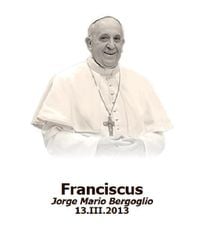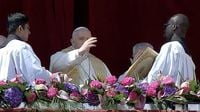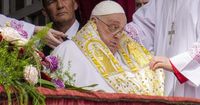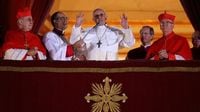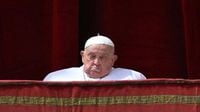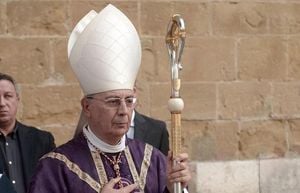The Christian world is in mourning following the death of Pope Francis, who passed away on Easter Monday, April 21, 2025, at the age of 88. The Vatican announced that he died at 7:35 AM in his residence at the Casa Santa Marta, just a day after making a public appearance to greet over 35,000 faithful in St. Peter's Square. Cardinal Kevin Farrell, the Vatican's camerlengo, confirmed the news, stating, "At 7:35 this morning, the Bishop of Rome, Francis, returned to the home of the Father. His entire life was dedicated to the service of the Lord and of his Church." The Pope's passing leads to a period known as sede vacante, during which the College of Cardinals will govern the Church until a new leader is elected.
The process of selecting a new Pope, known as a conclave, is expected to begin between 15 and 20 days after the Pope's death. This timeframe allows for mourning and for cardinals to travel to Rome. The conclave will convene in the Sistine Chapel, where the cardinals will gather after a special mass. Only cardinals under the age of 80 are eligible to vote, and as of March 2025, there are 137 such cardinals. During the conclave, the electors will vote up to four times a day, requiring a two-thirds majority to elect the new Pope.
The voting process is steeped in tradition, with each cardinal taking an oath of secrecy before entering the conclave. Once the doors are sealed, they are cut off from the outside world, and their deliberations are kept confidential. After each round of voting, the ballots are burned, producing either black or white smoke to indicate the outcome: black means no decision has been reached, while white signals that a new Pope has been chosen. The last conclave, which elected Pope Francis in 2013, lasted just one day, but the duration can vary widely.
As the world reflects on Pope Francis's legacy, it is clear that his papacy was marked by significant reforms aimed at modernizing the Catholic Church. He was the first Pope from the Americas and the first Jesuit to hold the position, having been elected in 2013. His efforts included promoting inclusivity, addressing contemporary issues, and advocating for a greater role for women within the Church. In 2024, he simplified papal funeral rites and chose to be buried in a simple wooden casket at Santa Maria Maggiore basilica, a decision that reflected his commitment to humility.
Speculation about potential successors has already begun, with several cardinals seen as leading candidates. Cardinal Pietro Parolin, the Vatican's Secretary of State, is known for his diplomatic skills and alignment with Francis's vision. Cardinal Luis Antonio Tagle from the Philippines is recognized for his pastoral approach, while Cardinal Matteo Zuppi of Italy is noted for his progressive views. Given that approximately 80% of the current cardinal electors were appointed by Pope Francis, it is likely that his successor will continue his reformist agenda.
The conclave will be a highly choreographed event. It begins with a special mass called "Pro Eligendo Romano Pontifice" (For the Election of the Roman Pontiff), after which the cardinals will process to the Sistine Chapel. There, they will take an oath on the Gospels, promising to keep the details of the conclave secret. Once the oath is taken, the master of ceremonies will announce "Extra omnes," meaning everyone else must leave the chapel.
Voting will take place in multiple rounds, with each cardinal writing their choice on a ballot paper inscribed with the words "Eligo in summum pontificem" (I elect as Supreme Pontiff). If a candidate receives the necessary two-thirds majority, the senior cardinal will ask him if he accepts his election. If he agrees, he will then choose a papal name and be dressed in papal vestments before addressing the world from the balcony of St. Peter's Basilica.
As the Catholic Church enters this period of transition, the world watches closely. The election of a new Pope will not only shape the future of the Church but also influence the global Catholic community, which numbers around 1.3 billion. The legacy of Pope Francis, with his calls for compassion, inclusivity, and reform, will undoubtedly resonate as the cardinals deliberate on who will lead the Church into its next chapter.
In the coming days, the Vatican will observe nine days of official mourning for Pope Francis, culminating in his funeral, which is scheduled to take place within six days of his death. His body will lie in state at St. Peter's Basilica for three days, allowing the faithful to pay their respects.
As the conclave approaches, the Catholic community is reminded of the historical significance of this process, which has remained largely unchanged for centuries. The last time a conclave was held, the world witnessed the swift election of Pope Francis, and there is hope that the next conclave will similarly reflect the will of the Church and its followers.
With Pope Francis's passing, the Catholic Church faces both a profound loss and a new beginning. The next Pope will inherit a legacy of reform and a call to address the pressing issues of our time, ensuring that the Church remains relevant and responsive to the needs of its global congregation.
